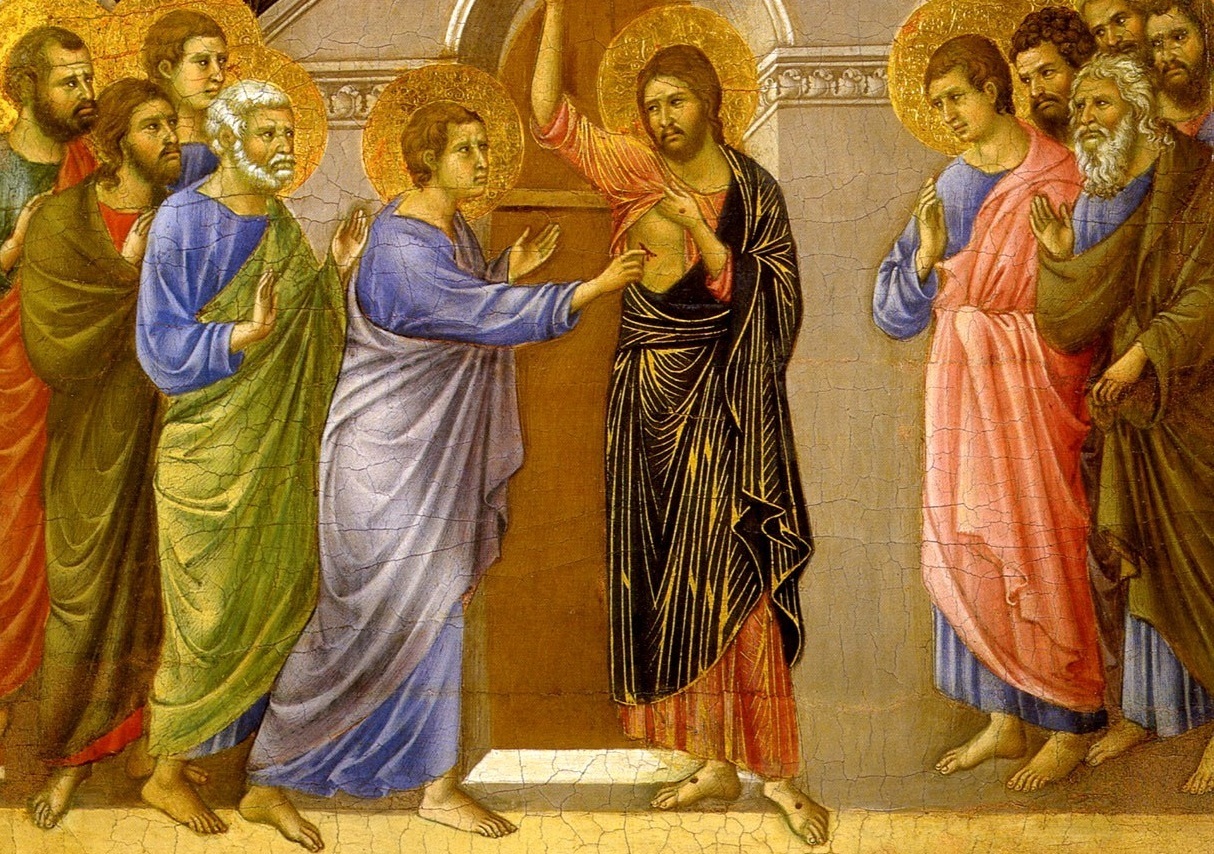
“Peace be with you!”
Dear friends: life is full of surprises. A few weeks ago we were eagerly awaiting some warmer weather and outside activities. Young people were looking forward to a week break from school. Joanne and I had a month to go before our vacation in Rome. What a difference a month can make! This week the highlight of our week is a trip to the grocery store. Our prayers are for the health of our families and recovery for people suffering from this pandemic. Maybe our present circumstance — literally locked in our rooms — makes it easier to understand the behaviour of the apostles in today’s gospel.
It had been very few days since Palm Sunday and Jesus’ triumphant entry into Jerusalem. What could go wrong for Jesus and his followers! Betrayal! Trial! Conviction! Torture! Scourging! Execution! All unjust and undeserved! Now the disciples were locked in a room for fear of the Jews. They had been told three times by Jesus that He would suffer, die, and rise again but that was before events had twisted in a different direction. And then, He appeared in that locked room! Imagine the joy! But Thomas was absent. Maybe he had gone shopping for groceries and was in line at Longos? Now the story unfolds.
We hear in today’s Gospel that Jesus came and appeared to the Disciples — but Thomas had just missed him. I wonder what the disciples thought about that. We always get on Thomas’ case about his doubting — “Doubting Thomas” — it’s even a cliché in our language. But is his doubt really what is central to this story? His “doubt” is no greater than the other disciples when they first heard the reports from the women who had gone to the tomb. And certainly his doubt is no greater than our own. But Jesus doesn’t hold Thomas’ doubt against him. When Jesus comes to Thomas he doesn’t say: “How could you not believe?” He offers himself freely and gives Thomas the very thing he seeks. But he also says to him: “Blessed are those who have not seen and yet believe”.
Thomas had doubted because he had missed Jesus. Missing Jesus — that’s the same reason the other ten disciples had doubted. Sometimes in our lives — especially these days when our world is in such trouble — we doubt that Jesus is really near us. It is in those moments when we are separated from Jesus — when we are not in Church, when we find it hard to pray, when we are too busy with the worries and stresses of a COVID-19 world — that we have doubts, when we miss Jesus in our lives. The presumption is that in order to have experienced Jesus, you had to have met him in person — in the flesh.
That’s what the disciples thought. They don’t believe the reports of the women right away. That’s what Thomas thought — he didn’t believe the reports of the disciples. That’s what some people in our world think — people who focus on fear and not faith — people who miss the opportunity to love their neighbour in this crisis — people who lock the door to their hearts. Some people look for any reason not to believe.
Thomas and the disciples are in many ways like us: reluctant to accept the fact that Christ can be present for us even when we are not in his physical presence. We too wish to see his wounds and touch them before we are willing to believe that he is present with us.
But notice how Jesus greets his disciples. Jesus twice said to his disciples: “Peace be with you!” The Lord did not come to earth to punish us. The risen Lord offers us mercy. Jesus offers each of us peace and reconciliation — or at least it is for those who truly desire the peace and mercy of God. If Jesus came to reconcile all in him, he none the less allows us to freely receive or refuse the grace of his forgiveness. This grace is always offered to us. It’s up to us to accept it. It is up to each one of us to choose to believe.
The story concerning Thomas has become banal, and yet this is an absolutely magnificent image of the entire life of the Church. Thomas, who at that moment was still far from being a “saint,” — desires at any cost to place his hand in the side of Christ; if he does not, he will not believe in the Resurrection of Jesus.
Like St. Thomas — and undoubtedly more than him — we need mercy. We need to place our hand in the side of Christ in order that our faith, our hope, our love of God and neighbour might increasingly grow in us.
In today’s Gospel we hear Jesus’ first words after his Resurrection — “Peace be with you.” Then He shows them his wounds, offers his peace again, sends them on a mission. He tells them to receive his Holy Spirit and to believe in Him. It’s the same message to us today. It is important to take his Easter gift of Peace seriously — to be at peace within ourselves, in our families, and with one another: To carry on our mission as witnesses of the Resurrection and to believe in Him — No matter what. Perhaps what is needed more than anything in our lives is “Shalom” — a harmonious equilibrium of health, prosperity, freedom, and security.
When Jesus does finally appear with Thomas present, He offers them Shalom once again. He invites Thomas to put his fingers into his hands and side. Thomas did not see the need to move a muscle other than his tongue and he utters one of the most beautiful, awesome phrases in the Gospel — My Lord and My God.
We need to trust in a Jesus who will enter into the places of our hearts in his own divine timing. We need trust that he is waiting for us with Love and mercy, ready to forgive and embrace us when we have the faith to say: “My Lord and My God.”
Shalom my friends,
-Dcn. Terry Murphy

